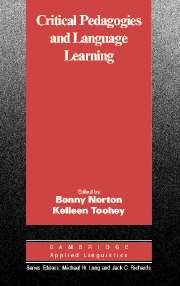Book contents
- Frontmatter
- Contents
- List of contributors
- Acknowledgments
- Chapter 1 Critical pedagogies and language learning: An introduction
- I RECONCEPTUALIZING SECOND LANGUAGE EDUCATION
- II CHALLENGING IDENTITIES
- Chapter 6 Representation, rights, and resources: Multimodal pedagogies in the language and literacy classroom
- Chapter 7 Subversive identities, pedagogical safe houses, and critical learning
- Chapter 8 “Why does this feel empowering?”: Thesis writing, concordancing, and the corporatizing university
- Chapter 9 Modals and memories: A grammar lesson on the Quebec referendum on sovereignty
- III RESEARCHING CRITICAL PRACTICES
- IV EDUCATING TEACHERS FOR CHANGE
- Author Index
- Subject Index
Chapter 7 - Subversive identities, pedagogical safe houses, and critical learning
Published online by Cambridge University Press: 05 October 2012
- Frontmatter
- Contents
- List of contributors
- Acknowledgments
- Chapter 1 Critical pedagogies and language learning: An introduction
- I RECONCEPTUALIZING SECOND LANGUAGE EDUCATION
- II CHALLENGING IDENTITIES
- Chapter 6 Representation, rights, and resources: Multimodal pedagogies in the language and literacy classroom
- Chapter 7 Subversive identities, pedagogical safe houses, and critical learning
- Chapter 8 “Why does this feel empowering?”: Thesis writing, concordancing, and the corporatizing university
- Chapter 9 Modals and memories: A grammar lesson on the Quebec referendum on sovereignty
- III RESEARCHING CRITICAL PRACTICES
- IV EDUCATING TEACHERS FOR CHANGE
- Author Index
- Subject Index
Summary
The practice of reserving something of oneself from the clutch of an institution … this recalcitrance is not an incidental mechanism of defence but rather an essential constitution of the self.
(Goffman, 1961, p. 319)A Century of English Education, written by John V. Chelliah (1922), a local teacher in my hometown while the British were still governing Sri Lanka, intends to glorify the pedagogy and policies of the colonial educational system. The teaching approaches of the missionaries are presented as very effective in creating a new breed of Sri Lankan Tamils who mastered the knowledge and language of the rulers. In these boarding schools, the missionaries wanted to isolate the students from the vernacular influences of their homes and mold them according to their new set of values. Occasionally, we see references to some unruly students in Chelliah's book. Such students have been dismissed from the school for escaping from the boarding at nights to attend Hindu temple festivals, maintaining secret miniature shrines for Hindu deities in their cupboards or desks, and surreptitiously practicing what are called heathen songs and dances. Though the author is ashamed by the hypocrisy in this behavior and is happy that such acts met with decisive punishment, it is possible to guess that many more of these acts went undiscovered. Those who read Chelliah's book today may have a new sense of respect for these students.
- Type
- Chapter
- Information
- Critical Pedagogies and Language Learning , pp. 116 - 137Publisher: Cambridge University PressPrint publication year: 2004
- 106
- Cited by



